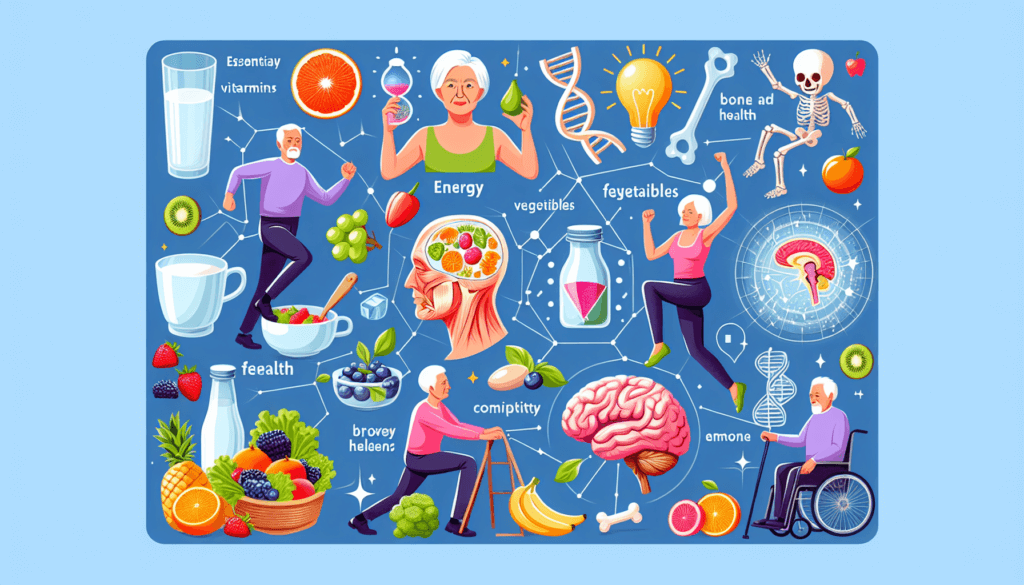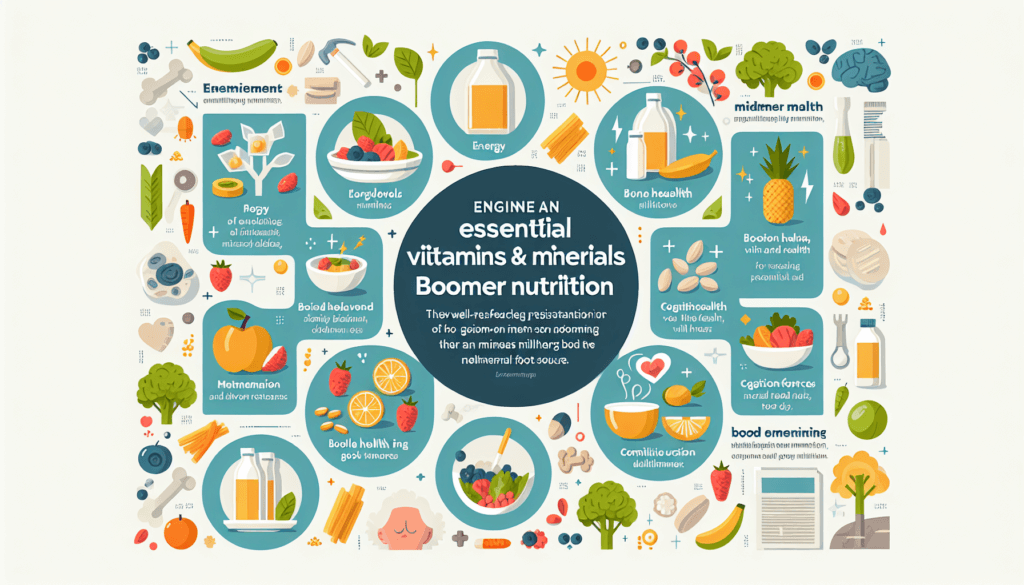You might be wondering what essential vitamins and minerals are crucial for boomer nutrition. As we age, our nutritional needs change, and it becomes increasingly important to ensure we are getting the right nutrients to support our health. In this article, we will explore the key vitamins and minerals that are essential for the wellbeing of boomers, helping you make informed decisions about your diet and overall nutritional intake. So let’s dive in and discover what our bodies need to thrive as we age!

Vitamins for Boomer Nutrition
As we age, it becomes even more important to pay attention to our nutritional needs. A well-balanced diet rich in essential vitamins and minerals is crucial for maintaining optimal health and vitality. In this article, we will explore the key vitamins and minerals that are particularly important for Boomers, discussing their importance, food sources, and recommended daily intake. So let’s dive right in and explore the world of boomer nutrition!
Vitamin A
Vitamin A, also known as retinol, is essential for maintaining good vision, a healthy immune system, and promoting cell growth. With age, the risk of developing age-related macular degeneration (AMD) increases, making vitamin A even more important for boomer nutrition.
Importance for Boomer Nutrition
Vitamin A plays a vital role in maintaining proper eye function, especially in low light conditions. It helps prevent age-related vision problems, such as cataracts and AMD, which are more prevalent in older adults. Additionally, vitamin A supports immune health by enhancing the body’s ability to fight off infections and illnesses.
Food sources of vitamin A
To ensure an adequate intake of vitamin A, it is important to consume foods rich in this essential nutrient. Some of the best sources of vitamin A include carrots, sweet potatoes, spinach, broccoli, and liver. These foods are not only delicious but also packed with other beneficial vitamins and minerals.
Recommended daily intake of vitamin A
The recommended daily intake of vitamin A for adults over the age of 50 is 700 to 900 micrograms (mcg) per day for men and 600 to 700 mcg per day for women. It is important to note that excessive intake of vitamin A through supplements can be harmful, so it is best to obtain it through a well-balanced diet.

Vitamin B12
Vitamin B12, also known as cobalamin, is crucial for boomer nutrition as it plays a key role in maintaining nerve function and producing red blood cells. As we age, our absorption of vitamin B12 can diminish, making it essential to ensure an adequate intake.
Importance for Boomer Nutrition
Vitamin B12 deficiency can lead to nerve damage, anemia, and cognitive decline, which are all common health concerns in older adults. By maintaining adequate levels of vitamin B12, boomers can support their nerve health, increase energy levels, and enhance brain function.
Food sources of vitamin B12
Vitamin B12 is predominantly found in animal products such as meat, fish, eggs, and dairy. For boomer vegetarians or vegans, it may be more challenging to obtain sufficient amounts of vitamin B12, making supplementation or fortified plant-based products a viable option.
Recommended daily intake of vitamin B12
The recommended daily intake of vitamin B12 for adults is 2.4 micrograms (mcg) per day. However, due to age-related absorption issues, boomers may benefit from slightly higher intakes. Consulting a healthcare professional can help determine the best dosage for individual needs.
Vitamin C
Vitamin C, also known as ascorbic acid, is a powerful antioxidant that plays a crucial role in boomer nutrition. It supports the immune system, aids collagen production, and provides protection against cell damage.
Importance for Boomer Nutrition
As we age, our immune system tends to weaken, making us more susceptible to infections and chronic diseases. Vitamin C helps enhance the immune response, reducing the frequency and severity of illnesses. Furthermore, vitamin C promotes collagen synthesis, which supports healthy skin, joints, and blood vessels.
Food sources of vitamin C
Citrus fruits, such as oranges and grapefruits, are well-known sources of vitamin C. Other excellent sources include strawberries, bell peppers, kiwi, and broccoli. Incorporating these fruits and vegetables into your daily diet can ensure an adequate intake of vitamin C.
Recommended daily intake of vitamin C
The recommended daily intake of vitamin C for adults is 75 to 90 milligrams (mg) for women and 90 to 120 mg for men. However, for boomers, it is often beneficial to consume higher amounts to support immune function and overall health.

Vitamin D
Vitamin D, often referred to as the sunshine vitamin, is essential for strong bones, immune function, and mental well-being. As we age, our bodies become less efficient at producing vitamin D from sunlight, making it necessary to obtain it from other sources.
Importance for Boomer Nutrition
Vitamin D plays a vital role in calcium absorption, promoting bone health and preventing osteoporosis. It also supports immune function, reducing the risk of infections. Additionally, recent studies suggest that vitamin D may play a role in reducing the risk of cognitive decline and depression in older adults.
Food sources of vitamin D
While limited food sources contain vitamin D, fatty fish like salmon and mackerel, fortified dairy products, and egg yolks are good dietary sources. However, it is often challenging to obtain sufficient vitamin D through diet alone, especially for those with limited sun exposure.
Recommended daily intake of vitamin D
The recommended daily intake of vitamin D for adults is 600 to 800 international units (IU) per day. However, boomers may require higher amounts, especially if they have limited sun exposure or specific health conditions. Consulting a healthcare professional can help determine the appropriate dosage.
Vitamin E
Vitamin E is a powerful antioxidant that plays a crucial role in maintaining healthy skin, protecting against cellular damage, and supporting eye health. It is particularly important for boomer nutrition as it helps prevent age-related illnesses and slows down the aging process.
Importance for Boomer Nutrition
As we age, oxidative stress increases, leading to cell damage and chronic diseases. Vitamin E’s antioxidant properties help neutralize free radicals, reducing the risk of age-related illnesses such as heart disease, cognitive decline, and certain types of cancer.
Food sources of vitamin E
Excellent sources of vitamin E include nuts, seeds, leafy green vegetables, vegetable oils, and fortified cereals. Consuming a variety of these foods can provide an adequate intake of vitamin E and its associated health benefits.
Recommended daily intake of vitamin E
The recommended daily intake of vitamin E for adults is 15 milligrams (mg) per day. It is important to note that excessive intake of vitamin E through supplements may have adverse effects. Hence, obtaining vitamin E from natural food sources is usually preferred.

Vitamin K
Vitamin K is crucial for blood clotting, promoting bone health, and supporting heart health. It plays a crucial role in boomer nutrition, particularly in maintaining bone density and reducing the risk of fractures.
Importance for Boomer Nutrition
As we age, bone density decreases, leading to an increased risk of fractures and osteoporosis. Vitamin K helps activate proteins that regulate bone mineralization, ensuring proper calcium deposition. Additionally, vitamin K supports heart health by preventing calcium buildup in arteries.
Food sources of vitamin K
Leafy green vegetables, such as kale, spinach, and broccoli, are excellent sources of vitamin K. Other sources include Brussels sprouts, cabbage, and fermented foods like sauerkraut. By incorporating these foods into your diet, you can maintain adequate levels of vitamin K.
Recommended daily intake of vitamin K
The recommended daily intake of vitamin K for adults is 90 to 120 micrograms (mcg) for women and 120 to 150 mcg for men. It is important to note that individuals taking blood-thinning medications should consult their healthcare provider, as vitamin K can interact with these medications.
Minerals for Boomer Nutrition
In addition to essential vitamins, minerals are equally crucial for boomer nutrition. Let’s explore some key minerals and their importance for maintaining optimal health in older adults.
Calcium
Calcium is essential for maintaining strong bones and teeth, preventing osteoporosis, and supporting proper muscle and nerve function.
Importance for Boomer Nutrition
As we age, calcium absorption decreases, making it vital for boomers to ensure an adequate intake of this mineral. Calcium helps maintain bone density, reducing the risk of fractures and osteoporosis. Additionally, it supports muscle and nerve function, promoting overall mobility and well-being.
Food sources of calcium
Dairy products, such as milk, yogurt, and cheese, are well-known sources of calcium. However, boomers who are lactose intolerant or follow a dairy-free diet can still obtain calcium from alternative sources like fortified plant-based milks, leafy green vegetables, and canned fish with bones.
Recommended daily intake of calcium
The recommended daily intake of calcium for adults over the age of 50 is 1000 to 1200 milligrams (mg) per day. It is often challenging to meet these requirements through diet alone, so supplementation may be necessary, especially for those with limited calcium intake.
Potassium
Potassium plays a crucial role in maintaining healthy blood pressure, proper nerve function, and supporting heart health.
Importance for Boomer Nutrition
As we age, the risk of developing high blood pressure and cardiovascular diseases increases. Potassium helps regulate blood pressure, reducing the risk of hypertension. Furthermore, it supports proper nerve function, muscle contractions, and assists in maintaining fluid balance in the body.
Food sources of potassium
Bananas are often associated with high potassium content, but there are many other sources as well. Good dietary sources of potassium include sweet potatoes, tomatoes, oranges, spinach, and avocados. By incorporating these foods into your meals, you can easily meet your potassium needs.
Recommended daily intake of potassium
The recommended daily intake of potassium for adults is 2,600 to 3,400 milligrams (mg) per day. However, it is important to note that individuals with certain health conditions, such as kidney disease, may require modifications to their potassium intake. Consulting a healthcare professional is advised in such cases.

Conclusion
Incorporating essential vitamins and minerals into your diet is vital for maintaining optimal health and well-being as a boomer. By focusing on nutrients like vitamin A, B12, C, D, E, and K, as well as minerals like calcium, magnesium, iron, zinc, selenium, and potassium, you can support your overall health and vitality. Remember to prioritize a well-balanced diet and consult a healthcare professional for personalized guidance and recommendations. Here’s to healthy aging and flourishing boomer nutrition!


